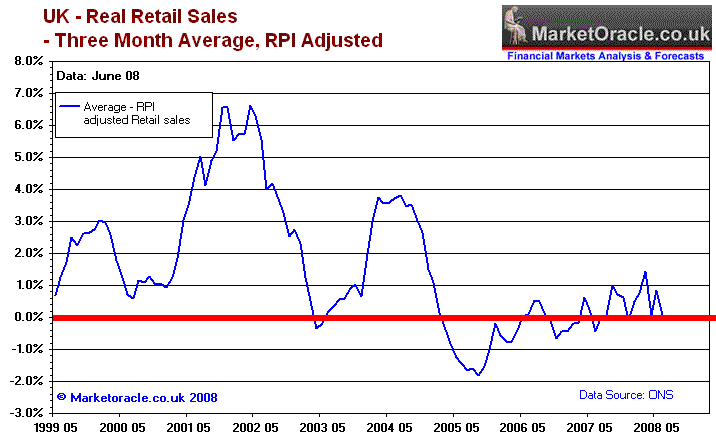Chancellor Darling Pushes Crumbling British Economy Over the Edge
Economics / UK Economy Sep 02, 2008 - 03:06 AM GMTBy: Nadeem_Walayat

 Gordon Browns Darling chancellor finally showed signs of cracking-up at the week-end as the strain of continually toeing Gordon Browns party line of ignoring the financial and economics fundamentals by painting a repetitively bright picture for the British economy and financial system finally got to him.
Gordon Browns Darling chancellor finally showed signs of cracking-up at the week-end as the strain of continually toeing Gordon Browns party line of ignoring the financial and economics fundamentals by painting a repetitively bright picture for the British economy and financial system finally got to him.
He commented: "Economic times are arguably the worst they've been in 60 years… I think it's going to be more profound and long-lasting than people thought".
All Gordon Brown could respond with was "Et tu brutus", as his premierships final days fast resemble a shakespearean tragedy.
Right from the beginning of the public manifestation of the credit crisis the politicians and the regulators have either not understood the nature of the crisis or deliberately mislead the public, fearful of loss of confidence amongst the electorate and creditors.
What's the Truth that the Public is Not Being told ?
The truth of the matter is bluntly that most banks are bankrupt, insolvent, kaput!, with liabilities far exceeding their assets.
How Can the Banks Be in Such Bad Shape ?
The banks in their greedy wisdom racked up huge profits during the credit boom years through the use of highly leveraged derivatives products where small movements on the underlying asset, for instance US house prices would translate into huge returns as many banks went beyond the traditional fractional reserve banking ratio of 10X assets to above X30. Some banks went even further in their eagerness to pay directors and top employees huge bonuses in plucking valuations out of thin air, thus overly inflated balance sheets saw huge leaps in profitability on the basis of figment mark to market valuations as open markets for the OTC derivatives does not exist . The consquences of which is that institutions are stuck with illiquid assets that they cannot accurately value and thus are continuously marking the value lower in an attempt to create liquidity to offload the illiquid derivatives.
Why are Assets falling in price ?
The bursting of the credit bubble effectively means that the banks are being forced to sell assets to cover the losses being incurred. This has the effect of delveraging their huge derivatives positions i.e. liquidating / reducing exposure. The problem the banks are facing is that the derivatives products are highly complex and illiquid, and hence the credit freeze as the banks barely know their own exposure let alone that of banks seeking to borrow on the inter bank money market, hence any cash the banks have is being hoarded in advance of further losses as giant holes are blown in the valuation of the derivatives such as collateral debt obligations.
Each and every quarter the banks announce further escalating losses, each time accompanied by public assurance's that the write down will be enough to cover future losses and thus the financial situation will improve hence forth only to be followed by further cash calls, capital injections and demands for government bailouts. Hence the consquences for the rapid abandonment of fiscal responsibility amongst panicking governments that have let loose their printing presses as the only answer towards attempt at counteracting the credit slump.
Off course it is not the governments job to tell the truth where bad news is concerned, as that would be politically literally suicidal, therefore chancellor Darling is definitely playing a game with his comments to deliver Gordon Brown a knock out punch ahead of the September Labour party conference, to ensure that rumors of a leadership challenge reach a fever pitch.
None of the above is news, for I have warned of these consquences right from the start of New Labour's downfall following Gordon Brown 's bottling out of calling the October 2007 general election which set in motion the train wreck that we see unfold before us today.
The battered and bruised British chancellor who repeatedly followed his bosses party line, to fudge the facts, and spin the story of Britain being the strongest economy in the west, best placed to whether the credit storm. When in reality Britain was expected and is expected to be hit the hardest of ALL the western economies as a consquences of the size of the UK financial sector and the lack of substance to Britain's manufacturing base. Forex traders belatedly woke up to this fact earlier this month when the herd smelled a wolf at sterling's door and stampeded for the exit into the dollar sending the Pound down from over £/$2.00 to breaking below $180 today. A fall of 10%, that's 10% devaluation on every asset, and in inflation terms is expected to more than counter the fall in crude oil from the mania level of $148 to today's $110, for manias are never sustainable as warned of several times during early July.
Blood Bath for Savers 2008
Whilst every one has been focusing on the crash in the UK housing market that has now passed 10% year on year and prompted the government into panic measures to be announced this week that will probably include a freeze on stamp duty for at least a year and shared ownership initiatives that will mean more money printing by the government. Many savers have been taking advantage of the situation of the distressed banks unable to borrow on the inter bank market offering high interest rates of between 6% and 7% to get cash in through the high street doors. However, savers as with other sterling asset holders are experiencing a real terms blood bath in loss of value of savings as currency adjusted declines range from between 5% and 10% since the start of the year. Add inflation of 4.4% and even at a high interest rate of 7%, savers are in effect destined to lose a minimum real terms purchasing power of 2.4%.
This is in effect a credit crunch tax on savers that is being funneled to the banks in the form of government bailouts as well as a consquences of growing government deficit spending such as the to be announced housing market initiatives. Even if many of the banks never become nationalized savers will have contributed their hard earned wealth towards keeping the banks afloat and thus experience a real terms loss of capital, that they may only realise when it comes time to apply the savings towards utilisation towards living costs and will wonder why although their bank balance has grown it fails to purchase the same goods and services as before? Implying that real UK inflation is far above either the official CPI and RPI rates due to inherent failures to weight the indices in favour of actual goods and services in demand, due to the fact that the indices include goods and services experiencing price cuts due to LACK OF DEMAND, hence skewing the indices towards under reporting the real rate of UK inflation. More on inflation in my UK inflation forecast due for imminent publication.
The situation for savers looks set to get far worse as the government busts through the 40% GDP debt rule, recent analysis concluded that UK debt as a % of GDP will be north of 60% the consquences of which would for a sharp fall in sterling which has transpired over the last few weeks as forex traders finally clocked onto this reality and sent sterling plummeting into a bear market, that is destined to continue until we pass the debt trough which at this moment in time implies continuing well into 2009.
What can savers do ?
The only thing that savers can do is to attempt to limit real terms losses as much as possible, this implies locking in fixed savings rates ahead of now increasingly anticipated interest rate cuts. The first port of call should be fixed rate cash ISA's which currently range between 6% and 6.3%. The next port of call should be Fixed rate bonds for at least 1year and preferably 2 years, in this guard savers have a short window of opportunity with rates ranging from between 6.3% to as high as 7%. The current market leader is ICICI Bank which pays 7.2% for terms of between 1 and 3 years.
A reminder to all savers that the maximum that should be deposited with any banking group (including anticipated interest earned) should be limited to £35,000, as that is the amount that is secured at 100% by the FSA. The government had indicated following the Northern Rock bust that this guarantee will be raised to £50k by the end of this year.
UK's Historic Boom is Over - 0% GDP Growth in Second Quarter
The Labour government has achieved ZERO growth for the 64th quarter, therefore ending Britain's historic and uninterrupted growth period.
However, the price deflator utilised by Britain implies that real GDP was negative for the second quarter which is the experience of corporate Britain, consumers and high street retailers. This fudge or inbuilt inaccuracy in economic data was most evident in the retail sales data, which after reporting a mini boom for May's data reported a bust for June. with the most recent data for July reporting a 0.8% decline.
The real rate of retail sales utlising our own methodology of averaging and indexation for inflation illustrates the real distress being experienced by high street retailers as the below graph illustrates.

The UK economy is on track to meet the Market Oracle forecast of GDP growth of 1.2% for 2008, with the economy now more than ever destined to enter a recession during early 2009, which crushes many of the existing economic forecasts made by major institutions that have yet to revise their forecasts lower from growth projections ranging between 1.5% and 2% for 2009.
By Nadeem Walayat
http://www.marketoracle.co.uk
Copyright © 2005-08 Marketoracle.co.uk (Market Oracle Ltd). All rights reserved.
Nadeem Walayat has over 20 years experience of trading, analysing and forecasting the financial markets, including one of few who both anticipated and Beat the 1987 Crash. Nadeem is the Editor of The Market Oracle, a FREE Daily Financial Markets Analysis & Forecasting online publication. We present in-depth analysis from over 150 experienced analysts on a range of views of the probable direction of the financial markets. Thus enabling our readers to arrive at an informed opinion on future market direction. http://www.marketoracle.co.uk
Disclaimer: The above is a matter of opinion provided for general information purposes only and is not intended as investment advice. Information and analysis above are derived from sources and utilising methods believed to be reliable, but we cannot accept responsibility for any trading losses you may incur as a result of this analysis. Individuals should consult with their personal financial advisors before engaging in any trading activities.
Nadeem Walayat Archive |
© 2005-2022 http://www.MarketOracle.co.uk - The Market Oracle is a FREE Daily Financial Markets Analysis & Forecasting online publication.
Comments
|
Christine
06 May 09, 10:31 |
Chancellor Darling
Darling will never be able to lead a country when he has got the balls to do what it takes in the first place |



